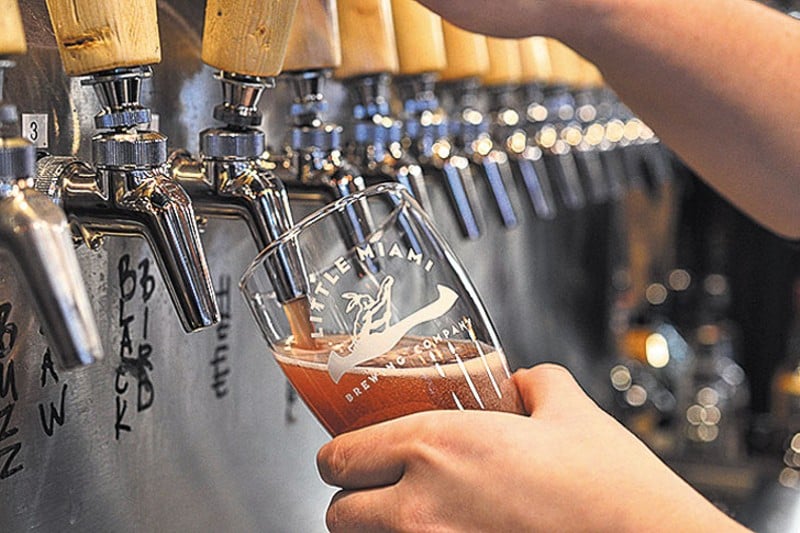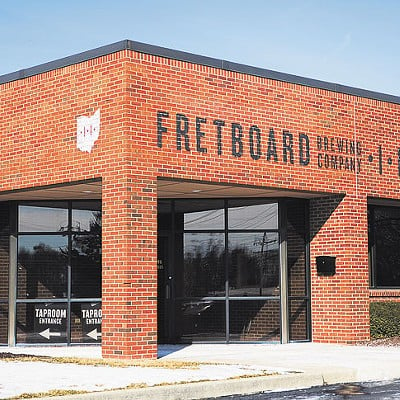
The United States is more than a decade deep into a craft beer boom, and Ohio is no exception. But a new coalition of brewers in Ohio argues provisions in state law are hampering the industry’s growth.
Getting beer from the brewery to your neighborhood bar or store shelf is generally the purview of a distributor. Ohio law allows brewers producing less than a million barrels a year to self-distribute, but that’s a big undertaking if you’re a brewer in Cincinnati trying to get to market in Toledo or Cleveland.
Still, many small brewers are reticent to sign on with a distributor.
Scott Schweitzer, a part owner of Olentangy River Brewing Company in Lewis Center, explained they plan to self-distribute as long as possible while acknowledging that doing so puts a ceiling on their business.
“It limits our ability to grow,” he said. “It limits our opportunity to expand our regions and our footprint, and, therefore, it limits our ability to, you know, hire more employees, get new products to market.”
So why would brewers avoid working with companies better equipped to move products around the state and help spur growth?
State franchise law
Since the end of prohibition, alcohol regulation has operated as a three-tier system. There are producers, distributors and retailers. None of them are supposed to engage in the work of the others. But that rigid separation of roles has softened somewhat over the years — think taprooms or brewpubs attached to craft breweries.
Aside from those exceptions, however, state laws and regulations draw bright lines around what companies can and can’t do. One example is 1974’s Ohio Alcoholic Beverages Franchise Act. Ohio Craft Brewers Association executive director Mary MacDonald explained the intent of that legislation was crystal clear.
“There were only 116 breweries in the entire country, and they held unmatched power and leverage over the more than 5,000 regional wholesalers who distributed their beer,” she said. “The franchise law was passed in 1974 to protect those small businesses from the undue influence on their massive suppliers.”
To keep brewers from playing distributors off one another, the law made it exceptionally difficult to dissolve a wholesale contract. Neither party can “cancel or fail to renew” a franchise agreement or “substantially change” the territory without showing just cause.
Now, craft brewers argue, that language effectively ties them to their distributor in perpetuity.
“That probably made sense in 1974,” Wolf’s Ridge Brewing owner and Craft Brewers Association president Alan Szuter acknowledged.
“It was a David and Goliath situation that the wholesalers were facing,” he went on. “The law was put in place to protect the small mom and pops. We are 180 degrees out from that — that has completely changed.”
To address that, craft brewers are seeking a carve out. Any brewer producing 250,000 barrels or less would not be subject to the franchise law.
“Some of these breweries are already in contracts,” MacDonald explained. “That contract would then hold as it’s written versus defaulting to franchise law which says you need to prove just cause to get out.”
Just cause
Jacob Evans, legislative affairs counsel for the Wholesale Beer and Wine Association, argued there’s no reason to change the existing system. He said different brewers have different needs, and under current law, they can negotiate for those in their contracts.
“So, when the argument is, ‘I can’t leave my wholesaler,’ the question is, why? Do you have just cause?” Evans asked.
“Well if you have just cause then you can leave the agreement just as you can with any business contract, any contract that’s out there,” he argued. “It does involve going to court, but I don’t know what contracts don’t involve going to court.”
But without just cause, which MacDonald noted is not defined in statute, state prohibitions on failing to renew offer either party significant leverage.
John Haggerty, the co-founder of Dayton brewery Warped Wing and advocacy chair for the Craft Brewers Association, brought up agreements on returning cooperage — kegs — on a regular basis. The distributor might agree to do so in negotiations, but if they don’t hold up their end, there’s little a brewer can do.
“That falls outside the constraints of franchise,” he explained, “I can’t terminate the agreement for that.”
Haggerty added brewers also have little recourse when distributors simply aren’t doing a very good job. He described assigning a territory growing at 30% to a distributor. That territory is now in decline by 30%, he claimed.
“The problem is, when I contract that wholesaler to do it, what happens if they don’t perform the way that we expected them to or the way they agreed to?” he asked. “In any other business, you would go and say, hey, I want to find an alternative logistics company to help me do this. But I’m not allowed to.”
Subscribe to CityBeat newsletters.
Follow us: Google News | NewsBreak | Reddit | Instagram | Facebook | Twitter













